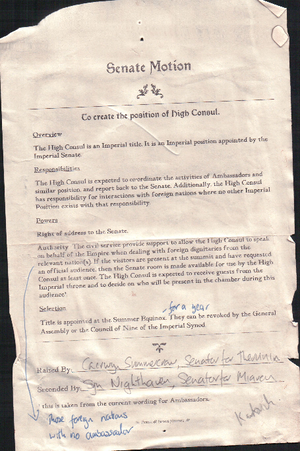Create title of High Consul
Proposed by Therunin, seconded by Miaren
Overview
- The title of High Consul would be an Imperial title appointed by the Imperial Senate.
- The title has the right to address the Senate.
- The title has the power to represent the Empire in all dealings with foreign nations where no other title with that power exists.
Date
- Summer 379YE
Campaign Outcome
- The Constitutional Court has recommend this motion be amended
Constitution
- Clarify that Right of Address is once per summit
- Clarify that the Consul has no legal right to issue instructions to ambassadors
- Amend the responsibility and change the name of the title to Imperial Consul
- OOC Note: Parts of this section were superseded by the 2018 rules update.
After scrutiny the Constitutional Court have issued clarifications on the right of address and the power of authority and requested minor amendments to the name of the title and the responsibilities.
Right of Address
The Right to Address the Senate is considered a constitutionally significant power, one which the Court are keen to ensure is not abused to monopolize the time of the Senate. It should be noted that the Imperial Throne only has the right to address the Senate once per summit. As such the only constitutional interpretation of the right to address the Senate in this context would be one in which the power may be used once per summit.
Authority
Authority can only be vested in a single Imperial title. While an ambassador may employ aides, assistants or a proxy, it is not legal for two Imperial titles to be granted authority to represent the Empire to the same foreign power at the same time. This motion avoids any conflict of identity by making clear which title will hold authority, but it is vital to stress that where an ambassador exists then it the power of authority is vested in that title. The title-holder is expected to discharge their duties without undue interference from any other Imperial citizen. If the Senate have granted a citizen authority to represent the Senate then the constitutional position is explicitly that the decision making responsibility lies with that citizen and no other.
It is constitutionally forbidden for a citizen to hold an Imperial title that conveys direct legal power or even responsibility over the discharge of powers of other Imperial titles, lest a citizen "accumulate so much responsibility that they consider themselves better than their fellows". The holder of an Imperial title must exercise their powers in person, not through the agency of other citizens who hold other titles.
Citizens shall not hold more than one high office at a time and must exercise their powers in person.
Imperial ConstitutionTitle and Responsibilities
The title of "High Consul" carries a legal implication that the title-holder occupies a position of authority over the existing ambassadors. This implication is further strengthened by the explicitly stated responsibility that the Consul will coordinate the existing ambassadors. Such a position of authority is categorically forbidden by the constitution.
To make the situation clearer, the Court have recommended that the title be amended to "Imperial Consul" and that the responsibilities be clarified such that the title is expected to liaise with existing ambassadors to keep the Senate informed of ongoing negotiations and developments.
